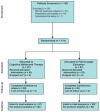Cognitive behavioral therapy for the treatment of juvenile fibromyalgia: a multisite, single-blind, randomized, controlled clinical trial
- PMID: 22108765
- PMCID: PMC3690664
- DOI: 10.1002/art.30644
Cognitive behavioral therapy for the treatment of juvenile fibromyalgia: a multisite, single-blind, randomized, controlled clinical trial
Abstract
Objective: Juvenile fibromyalgia syndrome (FMS) is a chronic musculoskeletal pain disorder in children and adolescents for which there are no evidence-based treatments. The objective of this multisite, single-blind, randomized clinical trial was to test whether cognitive-behavioral therapy (CBT) was superior to fibromyalgia (FM) education in reducing functional disability, pain, and symptoms of depression in juvenile FMS.
Methods: Participants were 114 adolescents (ages 11-18 years) with juvenile FMS. After receiving stable medications for 8 weeks, patients were randomized to either CBT or FM education and received 8 weekly individual sessions with a therapist and 2 booster sessions. Assessments were conducted at baseline, immediately following the 8-week treatment phase, and at 6-month followup.
Results: The majority of patients (87.7%) completed the trial per protocol. Intent-to-treat analyses showed that patients in both groups had significant reductions in functional disability, pain, and symptoms of depression at the end of the study, and CBT was significantly superior to FM education in reducing the primary outcome of functional disability (mean baseline to end-of-treatment difference between groups 5.39 [95% confidence interval 1.57, 9.22]). Reduction in symptoms of depression was clinically significant for both groups, with mean scores in the range of normal/nondepressed by the end of the study. Reduction in pain was not clinically significant for either group (<30% decrease in pain). There were no study-related adverse events.
Conclusion: In this controlled trial, CBT was found to be a safe and effective treatment for reducing functional disability and symptoms of depression in adolescents with juvenile FMS.
Trial registration: ClinicalTrials.gov NCT00086047.
Copyright © 2012 by the American College of Rheumatology.
Figures


References
-
- Mikkelsson M, Salminen JJ, Kautiainen H. Non-specific musculoskeletal pain in preadolescents: prevalence and 1-year persistence. Pain. 1997;73:29–35. - PubMed
-
- Sardini S, Ghirardini M, Betelemme L, Arpino C, Fatti F, Zanini F. Epidemiological study of a primary fibromyalgia in pediatric age. Minerva Pediatrica. 1996;48:543–50. In Italian. - PubMed
-
- Yunus MB, Masi AT. Juvenile primary fibromyalgia syndrome: a clinical study of thirty-three patients and matched normal controls. Arthritis Rheum. 1985;28:138–45. - PubMed
-
- Kashikar-Zuck S, Lynch AM, Graham TB, Swain NF, Mullen SM, Noll RB. Social functioning and peer relationships of adolescents with juvenile fibromyalgia syndrome. Arthritis Rheum. 2007;57:474–80. - PubMed
-
- Kashikar-Zuck S, Lynch AM, Slater S, Graham TB, Swain NF, Noll RB. Family factors, emotional functioning, and functional impairment in juvenile fibromyalgia syndrome. Arthritis Rheum. 2008;59:1392–8. - PubMed
Publication types
MeSH terms
Associated data
Grants and funding
LinkOut - more resources
Full Text Sources
Other Literature Sources
Medical
Miscellaneous

